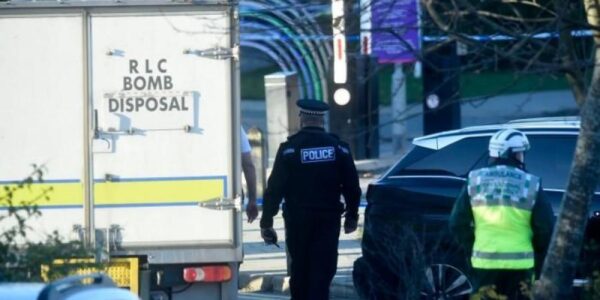
British counterterrorism police discovering more by the hour about Liverpool hospital attack
Counterterrorism police are discovering “more by the hour” about the attack that took place in Liverpool on Remembrance Sunday, Home Office minister Damian Hinds has said.
Police are investigating after a bomb exploded in a black cab outside Liverpool Women’s Hospital shortly before 11am on Remembrance Sunday, killing suspect Emad Al Swealmeen, who was in the back of the taxi.
The suspect is understood to be a Christian convert who reportedly had an asylum claim rejected in 2014.
Four men who were arrested under terrorism laws in connection with the incident have now been released without charge.
Following the incident, the UK terror threat level has been raised from substantial to severe, meaning an attack is “highly likely” rather than “likely”.
Hinds told Sky News it may take weeks for a full picture to emerge and that others may be involved.
He told Times Radio: “It is a live investigation and the police do have to have the space, the time, to be able to conduct that investigation fully and to carry on their searches of the key address and carry on with the analysis.
“It’s not impossible that there could be other people involved. If that is the case, as the police said in their statement last night, they’ll make arrests quickly.
“I’m not in a position to be able to comment on the background of the individual, the deceased individual or to speculate about the case.”
Hinds also warned of the rise of so-called “lone wolf” figures who had been radicalised during the pandemic — something Labour has said should be subject to a judge-led inquiry.
Hinds told Sky News: “It certainly is true that we’ve seen a move over time, a shift from these what we call directed attacks, part of a bigger organisation where people are following instructions, sometimes quite complex in their organisation, and move from that to more self-directed, some self-radicalised individuals or small groups, rarely totally, totally alone.
“There has been that move. During the lockdown periods there have been more people spending more time in front of computer screens and we know that when that happens for a very small minority, a very very small minority, there can be radicalisation.”
Shadow home secretary Nick Thomas-Symonds told BBC Breakfast that while people should be “careful about drawing conclusions too quickly” about the background of the perpetrator, more effective prevention measures needed to be taken.
“We don’t know the specific conclusions in the case in Liverpool yet as to whether someone was acting alone or in concert, and I’m not for a moment drawing that conclusion too prematurely,” he said.
“But I do think we need to be looking at the attacks that have taken place. Do we need something like a judge-led inquiry to look at the issue of lone attackers? And we need now, as I say, to get this investigation concluded as swiftly as possible, and then to look at the wider conclusions that perhaps we need to draw.”
Al Swealmeen is reported to have moved from the Middle East to the UK several years ago where he was supported by a Christian couple who housed him in the city.
Malcolm Hitchcott and his wife Elizabeth allowed Al Swealmeen to live with them when he arrived in the UK.
Hitchcott told The Sun he was “destitute at that time and we took him in.
“The UK asylum people were never convinced he was Syrian and he was refused asylum in 2014.
“He had his case rejected because he has been sectioned due to some mental health incident where he was waving a knife at people from an overpass.”
Elizabeth Hitchcott told the BBC: “We’re just so, so sad. We just loved him, he was a lovely guy.”
Asked whether they were shocked by the incident, she added: “Very.”
Source: Huffington Post





